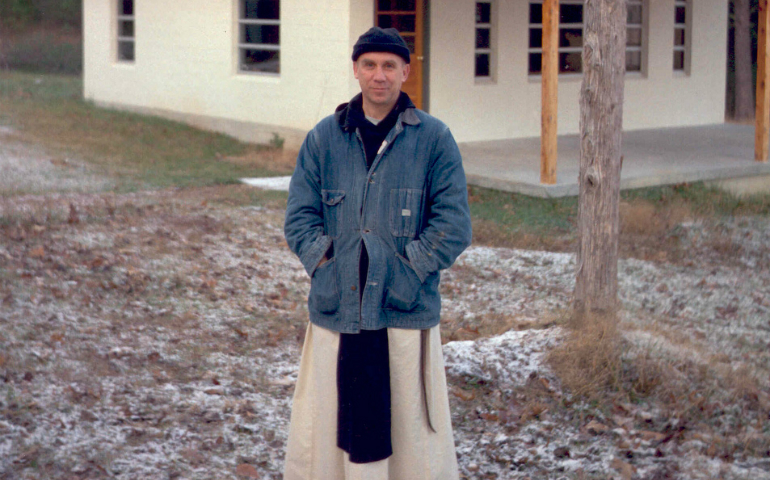
Trappist Fr. Thomas Merton, one of the most influential Catholic authors of the 20th century, is pictured in an undated photo. (CNS photo/Merton Legacy Trust and the Thomas Merton Center at Bellarmine University)
Editor's note: "Take and Read" is a weekly blog that features a different contributor's reflections on a specific book that changed their lives. Good books, as blog co-editors Congregation of St. Agnes Sr. Dianne Bergant and Michael Daley say, "can inspire, affirm, challenge, change, even disturb."
New Seeds of Contemplation
by Thomas Merton
New Directions, 1961
I discovered Thomas Merton in the midst of a laboratory. I was a doctoral student in pharmacology at New Jersey Medical School working on a model of moto-neuron disease known as ALS (Lou Gehrig's disease) and remember standing in the middle of the lab one day, procrastinating by thumbing through TIME magazine. I enjoyed reading the book review section and was struck by a new biography of a monk named Thomas Merton. I had never heard of Merton, but the summary of the book was intriguing. I went home that evening and reread the book review. The highlights of his life were fascinating: an intellectual from Columbia University whose cultural and literary life was relinquished for one of solitude and silence in a Trappist monastery. I was drawn to Merton like a magnet. I bought Monica Furlong's biography and read it in a single evening. I then went and purchased Merton's Seven Story Mountain and after finishing this book knew that I wanted to follow Merton's path. The rest, as they say, is history.
What drew me to Merton (and still does) was his deep inner search for truth and light, his inner yearning for God. I encountered his New Seeds of Contemplation while teaching a graduate spirituality course at Washington Theological Union. This book, in particular, encapsulated his spirituality for me — not in a biographical sense — but his profound soulful depth which at times seem to touch infinity. In fact, it is the opening chapters of this book that I return to again and again because they are, to me, like the opening chapters of Genesis, revealing the truth of creation and our capacity for God.
Two particular ideas stand out in the beginning that I think govern the flow of ideas throughout the book: prayer and self-identity. Merton explores the integral link between prayer and identity in his opening chapters, "Pray for Your Own Discovery" and "Things in Their Identity." He plumbs these ideas with the mind of a philosopher and the pen of a poet: "The seeds that are planted in my liberty at every moment, by God's will, are the seeds of my own identity, my own reality, my own happiness, my own sanctity. To refuse them is to refuse everything; it is the refusal of my own existence and being: of my identity, my very self."
Often we think of ourselves as finished products, as if God created us and then disappeared. But Merton, like the spiritual writer Beatrice Bruteau, realized how short-sighted this thinking can be. The "I" is not a finished product, something left over from God's creative activity; rather it is the very process of God's creative action. Merton, too, had something of this idea when he said, "Our vocation is not simply to be, but to work together with God in the creation of our own life, our own identity, our own destiny." To know this truth, Merton wrote, we are to "pray for our own discovery."
To pray, in the monastic sense, is to enter into dialogue with God, heart to heart. Prayer is that deep silent encounter in which the innermost center of our being continuously stretches toward that which is not yet seen or fully known; yet, it is a type of deep knowing that we belong to God. Merton drew on the integral relationship between God and the human person, as if defining the double helix of divinity and humanity: our lives are intertwined with God's life. "God utters me like a partial thought of himself," he wrote. Hence the only path to true happiness is prayer, and prayer begins with self-discovery.
Merton's chapter on self-identity is a classic on par with Saint Augustine's opening page of the Confessions: "You have made us for yourself O Lord, and our hearts are restless until they rest in You." Merton wrote: "The secret of our identity is hidden in the love and mercy of God." In fact, one could hear the voice of Augustine echoing throughout Merton's prose. For New Seeds of Contemplation aims to do what Augustine himself did, to discover the ground of our happiness, our true vocation as human persons. Merton's work like Augustine's Confessions is not a "how to" book but a foundations book; the ground of contemplation, the realization that there is no cogito or ego only SUM. Contemplation is the transcendence of all divisions into the higher reality of oneness-in-love: "It is our emptiness in the presence of His reality, our silence in the presence of His infinitely rich silence, our joy in the bosom of the serene darkness in which His light holds us absorbed, it is all this that praises Him."
It is apparent that the parable of the seeds (Luke 8:4-15) influenced Merton's thought. A farmer knows that seeds must be planted on rich fertile soil, free of rocks and debris, if good seeds are to bring forth good life. Similarly, to say that God utters me like a partial thought of himself is to say there is a seed of God planted in my life, but the inner soil of my heart must be fertile and free of hardened rocks if this seed is to grow into the fullness of my life. Merton becomes eloquent at times, his artistic prose drawing the lines between Creator and creature, like a painter scanning the canvas of the soul. Nowhere is he more expressive than in his chapter on the true and false self:
Every one of us is shadowed by an illusory person: a false self. This is the man that I want myself to be but who cannot exist, because God does not know anything about him. … My false and private self is the one who wants to exist outside the reach of God's will and God's love — outside of reality and outside of life. And such a life cannot help but be an illusion. … The secret of my identity is hidden in the love and mercy of God. … Therefore I cannot hope to find myself anywhere except in him. … Therefore there is only one problem on which all my existence, my peace and my happiness depend: to discover myself in discovering God. If I find Him, I will find myself, and if I find my true self I will find him (pp. 34-36).
The search for true identity requires an honest self-love. Love of self is not selfishness but a humble recognition of our lives as true, good and beautiful. Without real love of self, all other loves are distorted. Lack of self-knowledge, St. Bonaventure once wrote, makes for faulty knowledge in all other matters. Merton realized that so many people are weighed down by deep hurts, anger, resentment, lost loves, broken relationships, desperately seeking to fill their lives with happiness and peace. As he himself was searching for truth and identity, he came to a deep insight, that each human person already has what they are looking for: "Within myself is a metaphorical apex of existence at which I am held in being by my Creator."
Merton thought that to live the truth of our own existence is to be a saint. "A tree is holy," he wrote, "simply by being a tree;" flowers are saints gazing up into the face of God. We humans are no less called to be ourselves and in being ourselves to radiate the glory of God. However, very few people grasp the holiness of their lives. Rather, there is an implicit belief that God is watching from above and that we have to make our way to heaven to see God. Merton said, "We cannot go to heaven because we do not know where heaven is or what it is," so God comes to us. God comes down from heaven and finds us, just as God sought Adam in the Garden of Eden. There is nothing we can do or say that can alienate God from our lives. We can disown God, but God cannot disown us because God cannot disown God's own self; the self that is the very source of our lives. (2 Timothy 2:13)
Merton understood this inscrutable mystery by saying "our discovery of God is, in a way, God's discovery of us." Our praying to God is God praying in us. Our lives and God's life are so intertwined that loving God is God loving God's own self in us. Prayer is waking up to this reality, coming to a new consciousness of God's in-dwelling presence. "We become contemplatives," Merton wrote, "when God discovers himself in us." So God does not desire that we become anything other than the true self which God has loved from all eternity.
The chapters unfolding in New Seeds flow from this foundational truth of self-discovery in God. For if our life's journey is knowing the truth of ourselves in God, then all wars would cease, violence would be banished, the world would be a sacred sphere, broken bones would be healed and hearts mended. If we could discover this great mystery of God in us, we would be truly free, and out of this freedom the seeds of our lives would sprout into a new world of justice and peace.
[Ilia Delio teaches at Villanova University where she is the Josephine C. Connelly Chair in Christian Theology. Her latest book which she served as editor of is: Personal Transformation and a New Creation: The Spiritual Revolution of Beatrice Bruteau.]




